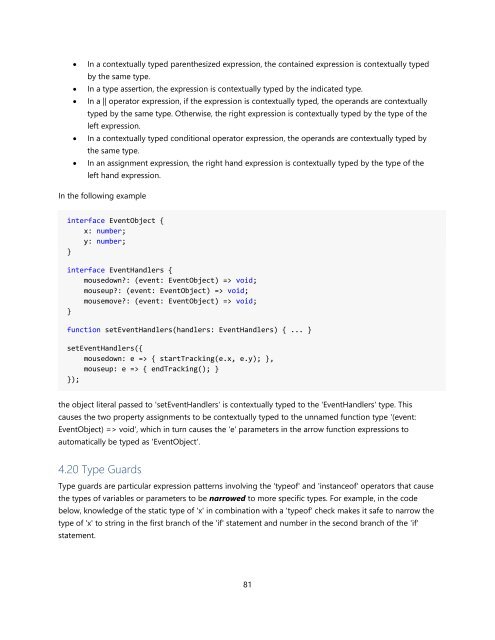TypeScript Language Specification v1.5
TypeScript Language Specification v1.5
TypeScript Language Specification v1.5
Create successful ePaper yourself
Turn your PDF publications into a flip-book with our unique Google optimized e-Paper software.
In a contextually typed parenthesized expression, the contained expression is contextually typed<br />
by the same type.<br />
In a type assertion, the expression is contextually typed by the indicated type.<br />
In a || operator expression, if the expression is contextually typed, the operands are contextually<br />
typed by the same type. Otherwise, the right expression is contextually typed by the type of the<br />
left expression.<br />
In a contextually typed conditional operator expression, the operands are contextually typed by<br />
the same type.<br />
In an assignment expression, the right hand expression is contextually typed by the type of the<br />
left hand expression.<br />
In the following example<br />
interface EventObject {<br />
x: number;<br />
y: number;<br />
}<br />
interface EventHandlers {<br />
mousedown?: (event: EventObject) => void;<br />
mouseup?: (event: EventObject) => void;<br />
mousemove?: (event: EventObject) => void;<br />
}<br />
function setEventHandlers(handlers: EventHandlers) { ... }<br />
setEventHandlers({<br />
mousedown: e => { startTracking(e.x, e.y); },<br />
mouseup: e => { endTracking(); }<br />
});<br />
the object literal passed to 'setEventHandlers' is contextually typed to the 'EventHandlers' type. This<br />
causes the two property assignments to be contextually typed to the unnamed function type '(event:<br />
EventObject) => void', which in turn causes the 'e' parameters in the arrow function expressions to<br />
automatically be typed as 'EventObject'.<br />
4.20 Type Guards<br />
Type guards are particular expression patterns involving the 'typeof' and 'instanceof' operators that cause<br />
the types of variables or parameters to be narrowed to more specific types. For example, in the code<br />
below, knowledge of the static type of 'x' in combination with a 'typeof' check makes it safe to narrow the<br />
type of 'x' to string in the first branch of the 'if' statement and number in the second branch of the 'if'<br />
statement.<br />
81


















